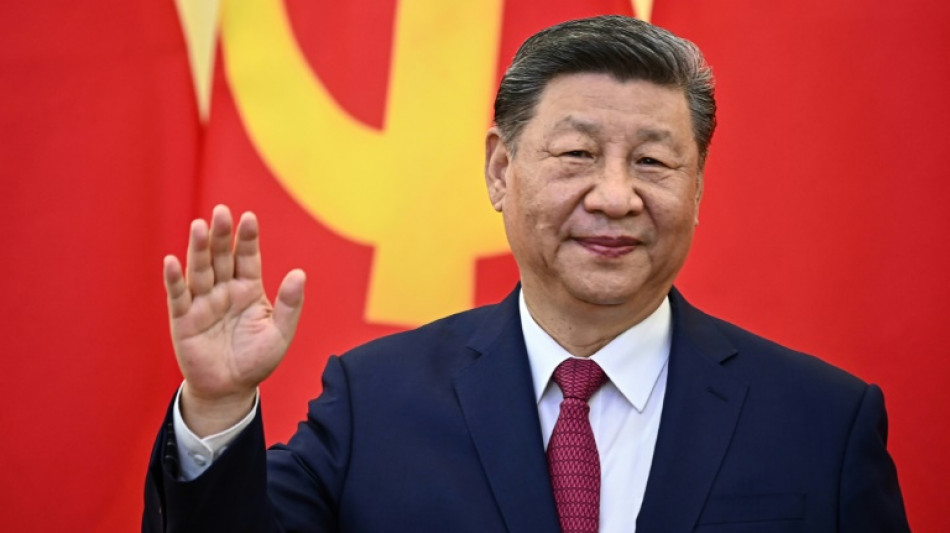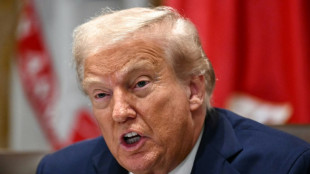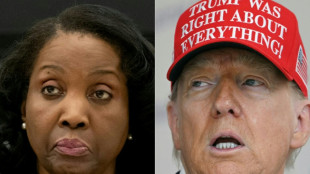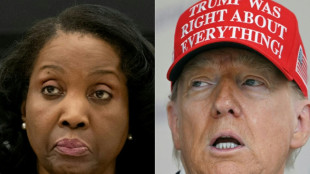
| RYCEF | 0.98% | 14.34 | $ | |
| VOD | -0.07% | 11.862 | $ | |
| RBGPF | 0% | 75.55 | $ | |
| BCC | -0.93% | 89.15 | $ | |
| RIO | -0.65% | 61.93 | $ | |
| SCS | 1.38% | 16.62 | $ | |
| CMSD | -0.53% | 23.893 | $ | |
| NGG | 0.93% | 71.15 | $ | |
| JRI | -0.45% | 13.37 | $ | |
| BCE | -1.02% | 24.965 | $ | |
| CMSC | 0.25% | 23.86 | $ | |
| GSK | 0.34% | 39.775 | $ | |
| BP | -1.08% | 34.595 | $ | |
| RELX | 0.07% | 47.825 | $ | |
| BTI | -0.79% | 57.345 | $ | |
| AZN | 0.31% | 79.905 | $ |
Merz, Xi discuss Ukraine war, trade woes amid global 'chaos'

Germany's Friedrich Merz urged Chinese President Xi Jinping on Friday to support a Ukraine ceasefire push and discussed thorny economic ties, in the leaders' first call since Merz became chancellor.
Asia's economic giant and Europe's top economy have long-standing trade and business ties.
This is despite political differences between Communist-ruled China and Germany that have deepened as Beijing has grown closer to Russia.
On Friday, both leaders "underlined their readiness to work together as partners", according to Merz's office.
The official Chinese readout of the call said Xi called for "stable and predictable ties" between Berlin and Beijing amid "the convergence of changes and chaos in the international situation".
Both countries have faced challenges in handling mercurial US President Donald Trump as he pursues detente with Russia and imposes sweeping tariffs on foreign imports to the United States.
On the topic of Ukraine, Merz's office said he told Xi about "the common efforts of Europe and the EU to bring about a quick ceasefire" and urged China to "support these efforts".
Diplomatic efforts to end the Ukraine conflict have increased in recent weeks.
A week ago, Russian and Ukrainian officials met in Istanbul for their first face-to-face talks in more than three years.
But the Kremlin said on Thursday that new peace talks with Ukraine had "yet to be agreed", disputing reports the two nations would soon hold negotiations at the Vatican.
Since Russia launched its full-scale invasion of Ukraine in February 2022, Beijing has portrayed itself as a neutral party in the conflict.
But the West has accused it of enabling Russia economically and diplomatically.
- 'De-risking'
In the phone call, Merz also touched on the vexed question of "fair competition" between German and Chinese businesses.
China has long been a key market for Germany's crucial manufacturers, who sell huge quantities of goods in China, ranging from cars to factory equipment.
But Berlin has been pursuing a policy of "de-risking" towards Beijing -- particularly since Russia's invasion of Ukraine stoked fears about maintaining close economic relations with authoritarian states.
This de-risking is aimed at reducing heavy economic dependence on China by encouraging economic ties with other fast-growing parts of Asia, although Berlin has stressed it is not seeking a total "de-coupling".
Chinese companies have also emerged as rivals to traditional German manufacturing titans, including in the auto sector.
For his part, Xi urged Germany to clear the path for more investment and to provide "a fair, transparent and non-discriminatory business environment for Chinese enterprises".
There have been several high-profile controversies over Chinese investment in sensitive sectors of the German economy.
In November 2022, Germany blocked the sale of two semiconductor makers to Chinese investors, saying the acquisition could "endanger the order and security of Germany".
In September 2023, Berlin blocked a complete Chinese takeover of a satellite startup on national security grounds.
A bid by Chinese state-owned shipping giant Cosco to buy a stake in a Hamburg port also sparked a furious row.
The sale was ultimately approved in 2023 but Cosco was allowed to buy a smaller stake than it had originally sought.
burs-jsk-sr/fz/gil
P.Beaulieu--SMC


 London
London

 Manchester
Manchester
 Glasgow
Glasgow
 Dublin
Dublin
 Belfast
Belfast
 Washington
Washington
 Denver
Denver
 Atlanta
Atlanta
 Dallas
Dallas
 Houston Texas
Houston Texas
 New Orleans
New Orleans
 El Paso
El Paso
 Phoenix
Phoenix
 Los Angeles
Los Angeles



